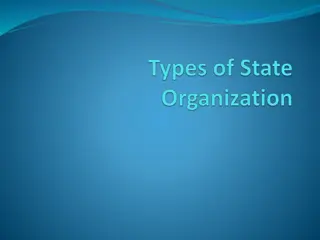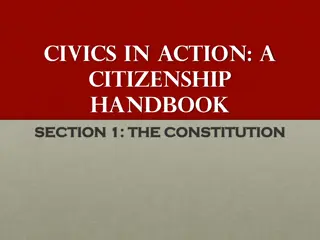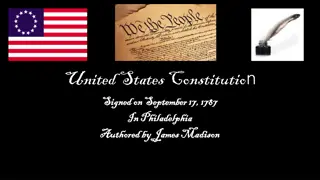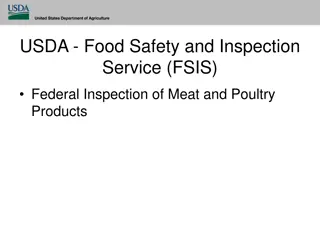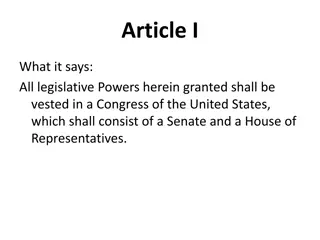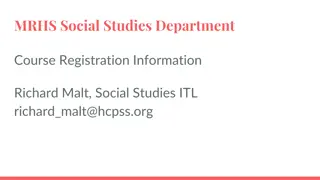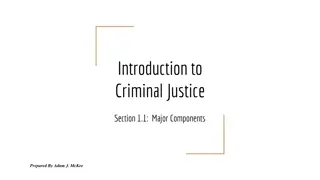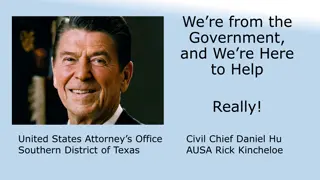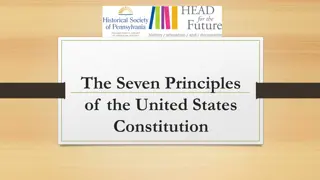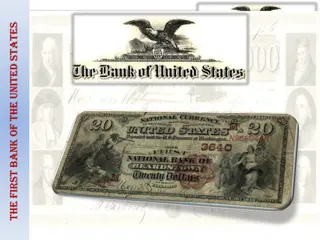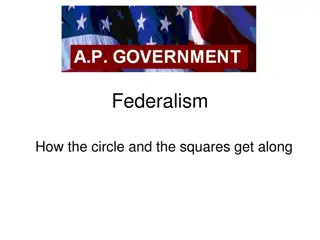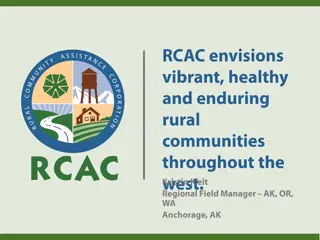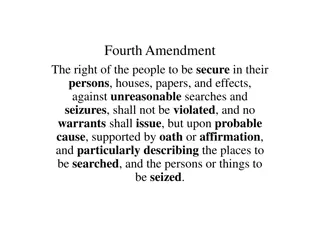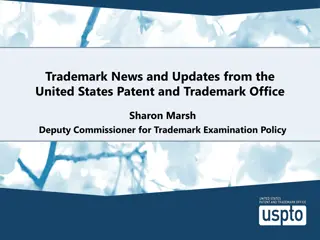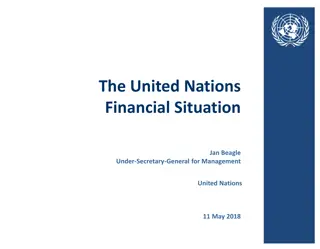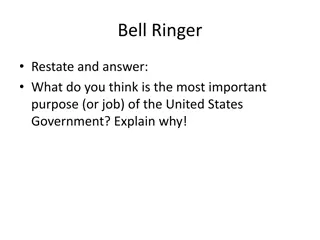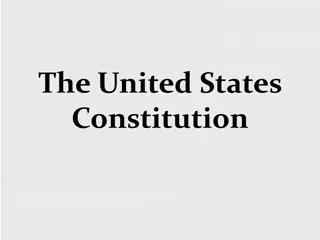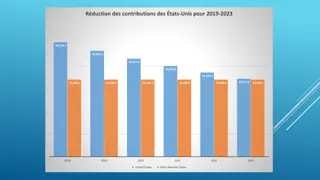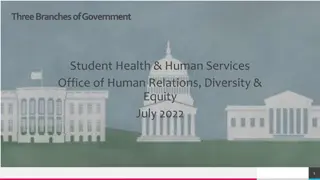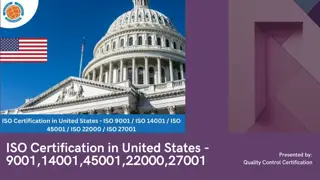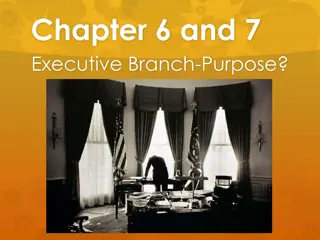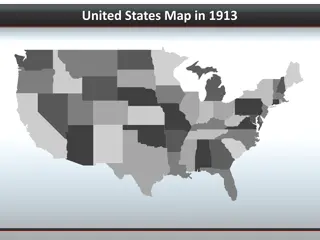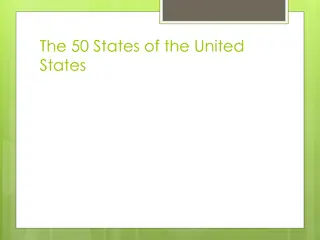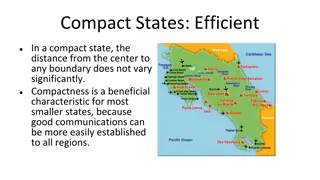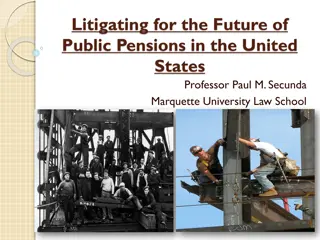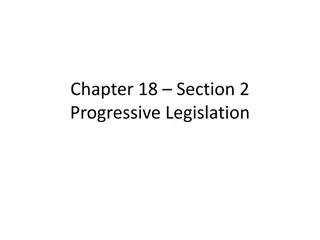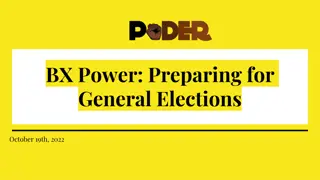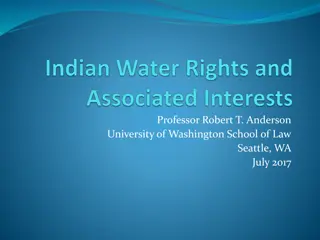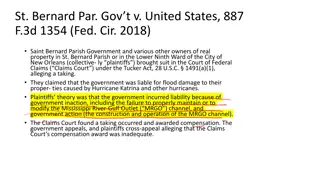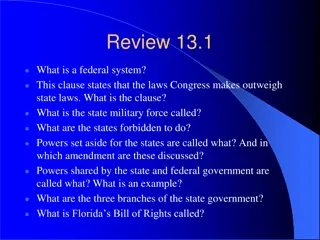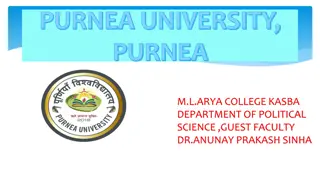United States v. Microsoft Corporation
The historical significance of Standard Oil and United States v. Microsoft Corporation in the context of antitrust laws, monopolies, and business practices. Learn about the rise of megacorps through efficiency, integration, and market dominance, contrasting wealth accumulation with royal fortune. De
4 views • 18 slides
Overview of Unitary, Confederal, and Federal States
Unitary, confederal, and federal states each have distinct characteristics regarding the distribution of power between central and subnational governments. Unitary states have centralized governance, while devolved states like the UK grant autonomy to subnational entities. Decentralized states trans
0 views • 22 slides
Understanding the Foundation of US Government: The Constitution and its Principles
The Constitution of the United States outlines key principles governing the government, including popular sovereignty, republicanism, limited government, federalism, separation of powers, checks and balances, and individual rights. It establishes six goals for the US government and delineates the po
2 views • 12 slides
Understanding the United States Constitution and Federalism
Delve into the history and significance of the United States Constitution, authored by James Madison in 1787. Explore the debate of ratification, Federalist vs. Anti-Federalist arguments, and the concept of Federalism, with a focus on the balance of powers between the central and state governments.
1 views • 23 slides
United States Food Safety and Inspection Service: Ensuring Meat and Poultry Products' Safety
The United States Department of Agriculture's Food Safety and Inspection Service (FSIS) oversees the federal inspection of meat and poultry products to ensure their safety for human consumption. The statutes governing this process include the Federal Meat Inspection Act, the Poultry Products Inspect
0 views • 23 slides
Overview of United States Constitution Articles
The United States Constitution consists of several articles outlining the separation of powers among the branches of government. It establishes the legislative, executive, and judicial branches as well as the procedures for amending the Constitution and recognizing state laws.
0 views • 13 slides
International Economic Indicators Comparison
The data presented includes GDP per capita rankings for various countries in 2015, showcasing the economic status of nations like Qatar, Norway, and the United States. It also illustrates the growth in GDP per capita from 2006 to 2015, with countries like China and India showing significant progress
2 views • 21 slides
Social Studies Course Offerings at MRHS
Explore the Social Studies department's course offerings at MRHS, including United States History for 9th grade, Honors United States History, and United States History GT. Each course provides a unique learning experience focusing on key historical themes, critical analysis of texts, and developmen
0 views • 4 slides
Overview of Criminal Justice System Components in the United States
The criminal justice system in the United States comprises various systems at state and federal levels. It consists of major components - Police, Courts, Corrections - bound by the Rule of Law and the Constitution. The Courts interpret laws and uphold civil liberties, with remedies available for vio
0 views • 28 slides
United States Attorney's Office, Southern District of Texas - Helping with Bankruptcy Matters
The United States Attorney's Office in the Southern District of Texas, led by Civil Chief Daniel Hu and AUSA Rick Kincheloe, assists with bankruptcy matters, representing the government in such cases. They work alongside other components of the U.S. Department of Justice, such as the Tax Division, t
0 views • 34 slides
Potential Impacts of Haemaphysalis longicornis on Equids in the United States
Haemaphysalis longicornis, an Asian longhorned tick, poses potential threats to equids in the United States. Originally from Northeast Asia, this tick has been detected in the U.S. and has a wide range of hosts, including cattle, sheep, dogs, humans, and various wildlife. Its parthenogenic reproduct
0 views • 14 slides
The Seven Principles of the United States Constitution Explained
The United States Constitution is based on seven key principles: Popular Sovereignty, Republicanism, Limited Government, Federalism, Separation of Powers, Checks and Balances, and Individual Rights. These principles outline the foundation of the American government, emphasizing the importance of cit
0 views • 9 slides
The First Bank of the United States: A Historical Overview
The First Bank of the United States played a crucial role as a national issue, highlighting the connection between financial power and control. This historical institution, established during George Washington's presidency, shaped the early economic landscape of the United States. As students reflec
0 views • 14 slides
Forming the United States: From Colonies to a New Government
Explore the journey of the 13 colonies as they came together to form the United States of America. Learn about the creation of the Constitution, the fears of the founders regarding the abuse of power, and the transition from the weak Articles of Confederation to a stronger central government followi
0 views • 29 slides
Understanding Federalism in the United States
Federalism in the United States involves the relationship between the federal government and state governments, with terms such as delegated powers, reserved powers, concurrent powers, and the Elastic Clause playing key roles. The aftermath of events like Hurricane Katrina and policies such as No Ch
0 views • 30 slides
Discover the Beauty of Western United States
Explore the diverse landscapes and enchanting destinations of the Western United States, from the rugged wilderness of Alaska to the sunny beaches of California. Immerse yourself in the stunning natural beauty of Arizona, the scenic wonders of Colorado, and the tropical paradise of Hawaii. These sta
0 views • 13 slides
Understanding Federal Taxes in the United States
Explore the key aspects of federal taxes in the United States, including individual and corporate income taxes, Social Security, Medicare, and unemployment taxes. Learn about tax brackets, withholding, tax returns, and more. Discover the economic importance of taxes and how they support the function
1 views • 15 slides
Understanding the Fourth Amendment: Search and Seizure Laws in the United States
The Fourth Amendment of the United States Constitution protects individuals from unreasonable searches and seizures by the government. It outlines the requirements for obtaining a search warrant, defines a reasonable expectation of privacy, and details the types of searches allowed without a warrant
0 views • 18 slides
Why the United States Entered World War I
The United States initially remained neutral during World War I, but various factors led to its eventual entry into the conflict. Growing anti-German sentiments, impact of the war on the American economy, incidents like the sinking of the Lusitania, and the revelation of the Zimmerman Telegram all p
0 views • 18 slides
United States Patent and Trademark Office Updates
Stay updated on the latest news and updates from the United States Patent and Trademark Office (USPTO) including trademark application filing levels, staffing information, performance measures, and e-government initiatives. Learn about fee levels for different types of trademark applications and the
0 views • 30 slides
United Nations Financial Situation Analysis
This analysis provides insights into the financial status of the United Nations as of various dates in 2016, 2017, and 2018. It includes data on assessments, payments, outstanding dues, cash on hand, and the number of member states paying in full. Charts visualize the regular budget assessment statu
0 views • 24 slides
The Core Purpose of the United States Government Explained
Understanding the critical purpose of the United States Government as outlined in the Preamble to the Constitution. The analysis delves into the goals of forming a more perfect union, establishing justice, ensuring domestic tranquility, providing for the common defense, promoting the general welfare
0 views • 26 slides
Exploring the United States Constitution: History and Meaning
Delve into the significance of the United States Constitution, the framework of the U.S. government. Learn about its creation, the preamble, and the core principles outlined in its articles. Discover fun facts and the enduring principles that guide the nation.
0 views • 20 slides
Solving N-Queens and Missionaries & Cannibals Problems Using Search Algorithms
Explore the application of search algorithms in solving classic problems like the N-Queens problem and the Missionaries & Cannibals dilemma. Understand the concept of states, start states, goals, transitions, and goal states in these puzzles. Dive into the strategies of adding states to a to-visit l
0 views • 8 slides
Financial Overview of Reductions and Contributions in the United States (2019-2023)
The data highlights reductions in the contributions of the United States from 2019 to 2023, along with the total quota income of other member states. It also includes projected expenses and budgetary reductions applied annually, categorized into personnel and non-personnel. The information provides
0 views • 5 slides
Understanding the Three Branches of Government in the United States
Explore the structure of the United States government by learning about the Legislative, Judicial, and Executive branches. Discover the key roles and powers of each branch, including checks and balances, as well as their significance in maintaining a functional democratic system.
0 views • 13 slides
Understanding the Three Branches of Government in the United States
The United States government is divided into three branches: legislative, executive, and judicial. This division of powers ensures a system of checks and balances, preventing any one branch from becoming too powerful. Each branch has specific roles and functions, such as making laws, enforcing laws,
0 views • 8 slides
ISO Certification in United States 9001,14001,45001,22000,27001
We are here to provide your business with ISO certifications that matter. Quality Control Certification guides United States companies to easily meet ISO Certification in United States 9001,14001,45001,22000,27001 standards.\n\nVisit: \/\/qccertifi
1 views • 7 slides
Understanding the Executive Branch of the United States Government
The executive branch in the United States plays a crucial role in governance. It includes the President and Vice President, who have specific qualifications for office. The election process, term limits, and powers of the President are detailed, highlighting responsibilities from appointing official
0 views • 24 slides
Women's Suffrage Progress in the United States
Explore the historical timeline of women's suffrage in the United States from 1913 onwards, highlighting when different states granted women the right to vote. The provided images visually depict the states granting voting rights for women over the years, including those that did so before and after
0 views • 5 slides
Interesting Facts About the 50 States of the United States
Explore key information about the 50 states of the United States, including their abbreviations, statehood dates, capitals, state flowers and birds, nicknames, and mottos. Learn fascinating details about each state from Alabama to Delaware and beyond.
0 views • 51 slides
Characteristics of Different State Shapes Explained
Compact states have efficient communication due to their balanced shape, while prorupted states extend for access or disruption. Elongated states face potential isolation issues, and fragmented states are problematic with territorial pieces separated. Perforated states, like South Africa, completely
0 views • 17 slides
Public Pension Systems in the United States
Explore the differences between private and public sector pension systems in the United States. While private sector plans are regulated by ERISA, government pension plans have more freedom in design and structure. The overview includes insights on defined contribution and defined benefit plans, fed
0 views • 22 slides
Progressive Reforms in the United States
Progressive movements in the United States during the late 19th and early 20th centuries led to significant legislative changes at the federal, state, and municipal levels. Efforts focused on expanding the role of government in social welfare programs, municipal reforms to combat corruption, innovat
0 views • 10 slides
Understanding Ballot Measures in the United States
In the United States, a ballot measure is a law, issue, or question that is put to voters on a statewide or local ballot for decision-making. These measures can be initiated by citizens, referred by government bodies, or automatically placed on the ballot. Examples include proposals related to envir
0 views • 19 slides
Overview of Indian Water Rights Rooted in Federal Law
Indian water rights are deeply rooted in federal law, including principles such as aboriginal title and treaties. The conflicts between Indian and non-Indian rights have led to lengthy litigations and settlements. From common law roots to state water laws, the historical development of water rights
0 views • 30 slides
Legal Case Analysis: St. Bernard Parish Government v. United States
St. Bernard Parish Government and property owners filed a case under the Tucker Act, alleging a taking due to flood damage from Hurricane Katrina. The Claims Court found in favor of the plaintiffs, which the government appealed. The case involves issues of government liability, impact of the Mississ
0 views • 14 slides
Understanding Flood Control Acts and Related Legal Cases
Explore the history and implications of flood control acts like the Flood Control Act of 1928, including the immunity provisions for the United States in case of flood-related damages. Learn about the Compensation Clause and the procedures for suing the government for flood damages under the FTCA. D
0 views • 37 slides
Overview of State Government and State Legislatures in Florida
A federal system is a political framework where power is divided between a central government and individual states. In this system, laws created by Congress take precedence over state laws. The supremacy clause enforces this hierarchy. States are prohibited from actions like declaring war or mintin
0 views • 12 slides
Overview of the United States Congress and Political System
The United States Congress is the bicameral legislature of the federal government, composed of the House of Representatives and the Senate. Representatives are elected every two years based on districts, while senators serve six-year terms elected at-large in their states. Congress consists of 535 m
0 views • 6 slides

